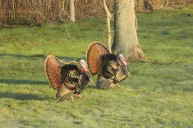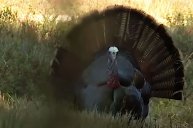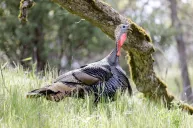Florida wildlife authorities say they arrested four men who tricked their customers into harvesting prized Osceola turkeys when in fact they just bred them to look that way.
In a July 24 announcement, the Florida Fish & Wildlife Conservation Commission said officers charged Larry Collins, David Mills, Paul Beckham, and Vernon Flowers with multiple felonies for the scheme. Those charges include organized fraud, conspiracy, cheating, and unlawful use of a two-way communication device.
Lt. Col. Randy Bowlin, an FWC deputy director of law enforcement operations, described the group as deceiving not only hunters but also the revered species. "Hunters can be reassured that the opportunity to hunt a wild Osceola turkey will remain, and legitimate outfitters will not have competition from unethical and fraudulent turkey guide services or outfitters," he said.
The Osceola turkey hunting scheme
Investigators outlined the entire scheme in a 57-page affidavit for an arrest warrant. In the document, they allege that Collins advertised Osceola turkey hunts on his website Razzor Ranch and social media pages; Mills raised turkeys in another county to look like Osceola turkeys for those hunts; both Mills and Beckham served as guides for the hunts; and then they'd direct customers to Flowers, who ran a taxidermy business.

A screenshot from a court document showing hunters after they harvested fake Osceola turkeys. Credit: FWC
Although officials noted caged turkeys in previous inspections of Razzor Ranch, the initial investigation into the fraud case began in March 2021 after a victim contacted the authorities. During an interview, the victim said he believed the guides led him on a turkey hunt in an off-limits area of the state. What tipped him off, though, was that he brought his bird to another taxidermist, who identified the turkey as a domesticated breed.
Then, investigators brought the bird in for forensic testing, where FWC scientists examined the bird's morphology and found characteristics inconsistent with Osceola turkeys. Afterward, they conducted DNA testing by comparing feathers from the fraudulent turkey with a wild Osceola turkey and found it had more in common with a domesticated breed.
In court documents, investigators describe Osceola turkeys as a unique subspecies of turkey found only in Florida. With a small population and limited range, they don't exist anywhere else in the world. They added that many consider hunting the bird as "The Grand Slam" of all turkey hunting opportunities.
According to the affidavit, investigators identified at least 10 victims, who paid between $2,000 and $3,600 for Osceola turkey hunts between the years 2020 and 2022. In all, they say the group earned more than $25,000 from fraudulent Osceola turkey hunts.




